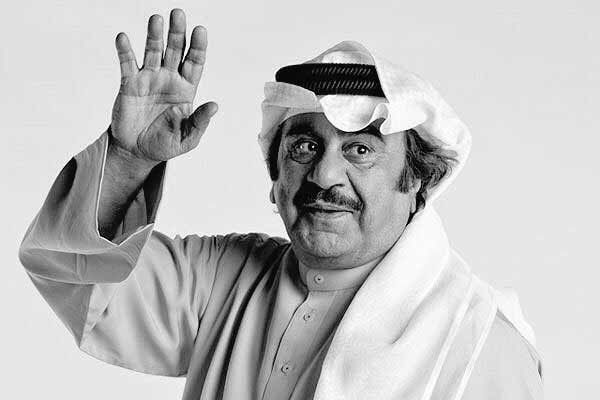
Manama: The Arab world on Saturday paid heartbreaking tributes to Abdul Hussain Abdul Redha, the iconic Kuwaiti actor, who died in a London hospital on Friday. He was 78.
Thanks to a rare combination of great skills, meaningful messages and dedicated work, the actor won the hearts and minds of millions of people over more than four decades.
Abdul Redha, affectionately known as “Abu Adnan”, after his eldest son’s name, died on Friday night in a London hospital, a city that he used as a backdrop to one of his most applauded satirical and symbolic comedies “Bye Bye London” about nouveau riche Arabs in the British capital.
“Get off my back, I’m in London to have fun, to change scenery and enjoy myself. I’m not in London to be hospitalised,” was a line ‘Abu Adnan’ said in the 1981 play “Bye Bye London,” Kuwait News Agency (Kuna) said in its homage to the actor.
Born on July 15, 1939 in Dirwazat Abdul Razzaq, Sharq, Kuwait, Abdul Redha was the seventh among 14 siblings.
He did not start his career as an actor, but first worked in the Department of Printing of the Ministry of Guidance and Information. He travelled on a scholarship to Egypt in 1956 to learn printmaking, and in 1961 he went to Germany to complete his studies in printmaking arts.
The son of a ship captain, Abdul Redha’s talent of performing to crowds and his ability to make people laugh came to fore when he was a young boy. He and his siblings used to entertain their mother while the father was at sea for months in a year.
His raw talent as an actor was nurtured, developed and put on the right track after Abdul Redha returned from Germany and started working with Egyptian director Zaki Tulaimat. After that he carved his own way to become one of Kuwait’s and the Arabian Gulf’s iconic actors.
With dozens of plays, TV and radio series to his credit that spanned from the early 1960s all the way to 2017, Abdul Redha asserted himself among Arab Gulf actors to make his name in the Arab world.
His side-splitting slapstick comedy in the 1960s that included Hawer Zawer and Al Malgouf, dashing performances during the 1970s that included Bani Samit and Dhahiyat Bait Al Ezz, and mature and well-rounded productions in the 1980s that included Fursan Al Manakh, Bye Bye Arab, continued until the end of his career.
Even live bullets could not steer Abdul Redha off his path. He was the target of an assassination attempt due to his role portraying the former Iraqi dictator Saddam Hussein in the 1991 play, Saif Al Arab, the Arabs’ Sword, with its searing satirical interpretation of then Iraqi president.
Even though he was targeted on his way to the theatre, Abdul Redha refused to cancel or even delay the show on that night, Kuna added.
His last work was in Ramadan this year when he made a guest appearance in the widely popular comic series “Selfie”, with one of the highest viewership rate across the Arabian Gulf.
Frequently referred to as Kuwait’s ‘fourth tower’, Abdul Redha was in many ways seen by his fans of different generations, as the personification of the Kuwaiti man, whether it was for his political humour, social rants, or speech and appearance.
Tributes have been pouring in for Abdul Redha since announcement of his death.
Bahraini actress Haifa Hussain said that although she never had the chance to work with Abdul Redha, she cried profusely when she heard the news of his death.
“I was not fortunate enough to work with him although it was my dream to get close to him and learn so much from this iconic figure,” she posted on her Instagram account. “I heard the shocking news when I woke up and tears rolled down my face. We had lost the most significant name on the art scene. He was an integral part of our lives and he made us both laugh and cry for years. We felt so close to him. May God rest his soul in eternal peace.”
Bahrain media figure Fareed Eisa said that the Arabian Gulf was deeply saddened by the shocking news.
“When Gulf people heard about the great actor and artiste Abdul Hussain Abdul Redha being admitted to a hospital in London, they felt at pain and wished him a speedy recovery,” he said. “The news of his demise affected us all and all Gulf houses were saddened by the painful loss of someone who had been with them in their homes and elsewhere for more than 40 years. We all condoled with one another, looking for solace and support, while praying for fortitude for his family.”
One of Abdul Redha’s greatest merits is that he was able to concoct several proverbs and expressions that were embraced by people in the Gulf.
“It is given to very few people to amend laws and regulations in Kuwait and other Gulf Cooperation Council (GCC) states and Abdul Hussain was one of them. He changed mindsets and views and had a very positive influence on young people. Many saw in him a role model,” Fareed said.
“I still recall with vividness how he refused to leave Kuwait when Iraqi troops invaded in August 1990. He was truly brave and stayed in the country for the seven months of the occupation. When Kuwait was liberated, he asked Kuwaitis not to compromise their morals and values and to treat Iraqi prisoners of war kindly in line with Islamic and Gulf values.”
Fareed added that the news of Abdul Redha’s death was a very painful way to start the day.
“We have loved him dearly and we shall always be grateful for all the things he taught us, for all the character-building messages he conveyed to young people and to all the hope he helped instill in us despite adverse conditions.”
Social media was abuzz with tributes to the legendary artiste and several users posted personal or public pictures they had of Abdul Redha.
Hasan Sajwani, an Emirati banker, posted on Twitter a short clip from Bye Bye London, one of the most famous plays starring Abdul Redha as a tribute to the “Arab legend whom we will never forget.”
Basma Al Alawi, from Bahrain, posted: “You will always be in our hearts and our best source of laughter.”
Juma Al Araimi said that he was “saddened by loss of one of the founders of art movement and pioneers of Gulf theatre in Kuwait and the Arab world.”
Nawal, from Northwestern University, said: “Still in the denial phase as I read tweets regarding this [Al Redha’s death]. He is a legend who will always remain present.”
Ahmad Herfy said that “the Arab iconic comedian died “leaving a legacy that will stay forever.”
Another user said that “in fact, the whole Arab world has lost a one of a kind legend.”
For Mohammad Azwied, “legends never die.”
Hamdino, a Twitter user, said that Abdul Redha’s death “hit hard because we grew up watching him.”
“Thank you for putting a smile on our faces.”
Toti Al Rashed, a medical student said, Abdul Redha will always be “a special person, a special face, a special someone we cannot replace.”
Under a picture of his smiling face, she wrote: “Adieu to beautiful art.”
In another tweet, she lamented that “a thousand words won’t bring you back.”
However, the Kuwaiti actor will always be recalled with fondness. “You may leave, but your memories remains in our hearts,” she said.
For Marhaf Al Mutairi, Abdul Redha will always live in people’s hearts and minds.
“Some people even when they die they leave behind them memories. We can’t forget them; they’re unforgettable.”












